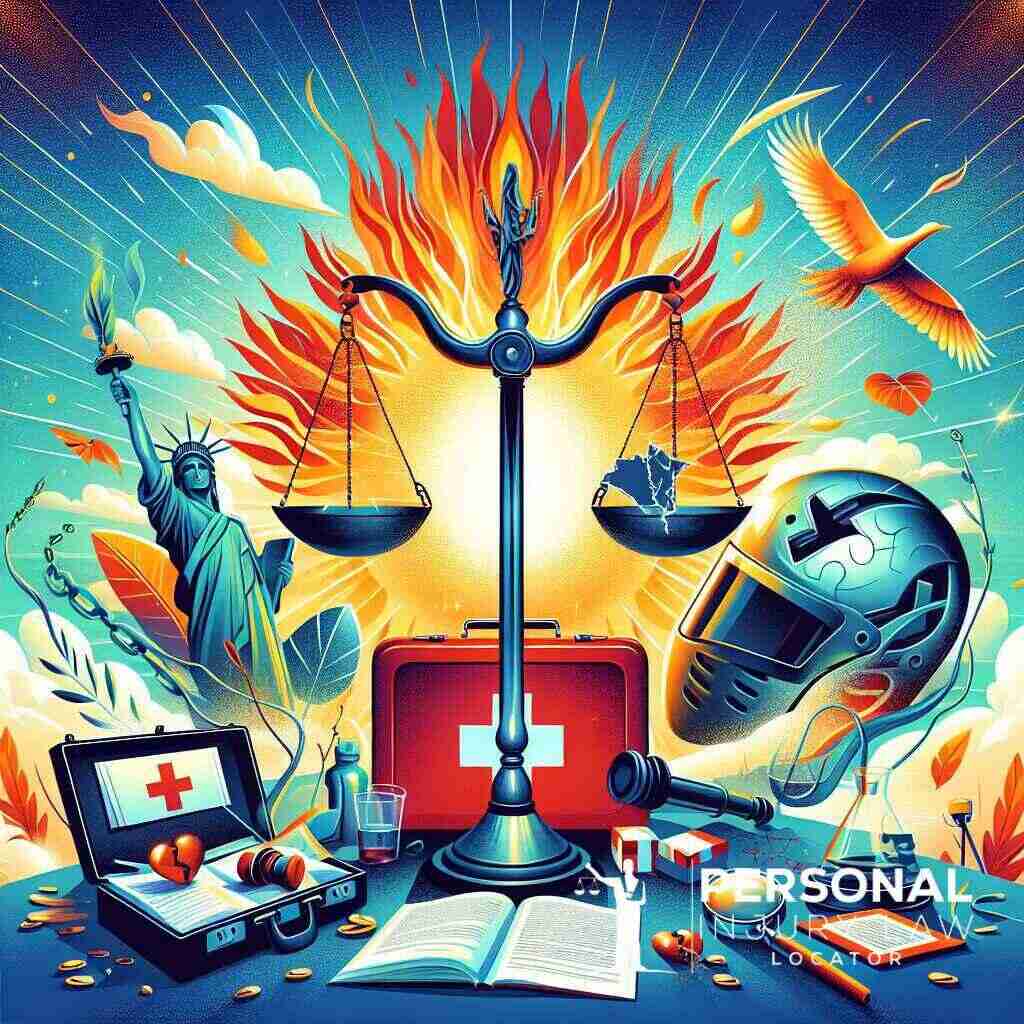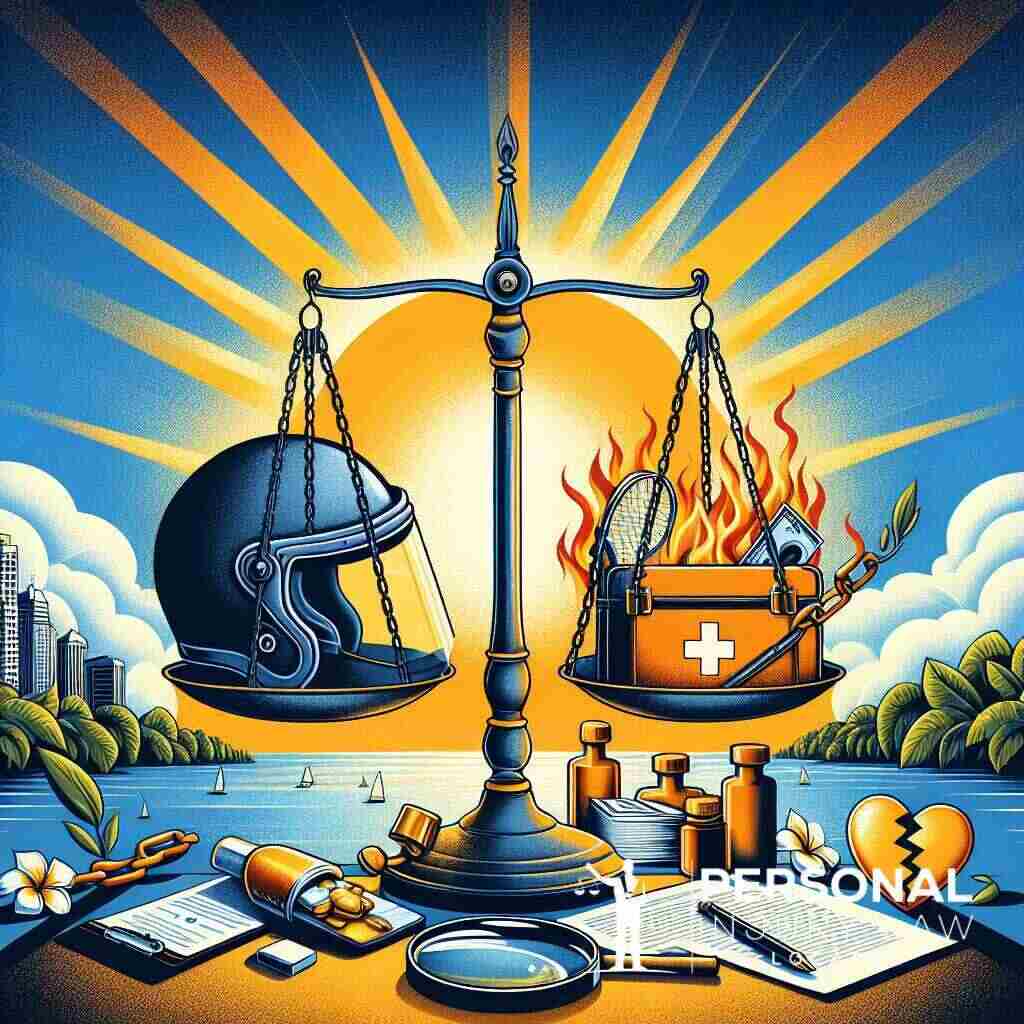 Posted On: 04/25/2024
Posted On: 04/25/2024Navigating Florida’s Legal Waters
Understanding the Personal Injury Claim Process in Florida
When initiating a personal injury claim in Florida, it’s imperative to grasp the basics of the state’s legal framework. Florida personal injury laws dictate how claims are filed, the timeline for filing, and the types of compensation an injured party may be eligible for. A foundational step in this journey involves acknowledging the state’s no-fault insurance system for car accidents, which requires injured parties to seek compensation through their own insurance coverage up to a certain limit before pursuing a claim against the at-fault party. This unique aspect of Florida law underscores the importance of consulting with a personal injury attorney near you who is well-versed in navigating these specific legal waters.
The efficacy of your claim largely depends on your ability to prove negligence on the part of the other party involved in the incident. Understanding negligence proof in Florida is critical, as the state adheres to a comparative negligence system. This means that if you are found partially at fault for the accident, your compensation can be proportionately reduced. Proving negligence, therefore, becomes a cornerstone of your claim, requiring a comprehensive collection of evidence and strategic legal interpretation.
Maximizing Your Chances for a Successful Injury Claim
To enhance your chances of a favorable outcome in your personal injury claim, thorough preparation and strategic planning are key. Start by meticulously documenting every detail related to your injury and the circumstances surrounding it. This includes medical records, accident reports, and any correspondence with insurance companies. Engaging with a skilled legal professional early on can significantly influence the direction and success of your claim. A knowledgeable attorney can offer crucial injury claim legal advice in Florida, guiding you through the complex negotiation process with insurance companies and advocating for your best interests in court if necessary.
Another vital component of a successful injury claim is accurately calculating and documenting all damages. This not only encompasses immediate medical bills and property damage but also long-term costs such as ongoing medical treatment, loss of earnings, and emotional distress. Understanding the full scope of compensable damages in Florida is essential to ensure you’re not settling for less than you deserve.
Employing effective negotiation strategies is also paramount. Insurance companies are in the business of minimizing payouts, and without a formidable legal strategy, claimants risk accepting settlements that fall short of covering the full extent of their injuries and losses. Preparation for trial, even if a settlement is the preferred outcome, strengthens your negotiating position, signaling to the insurance company that you are ready to fight for the compensation you are entitled to.
By mastering these aspects of the Florida personal injury claim process and leveraging professional legal assistance, injured parties can significantly enhance their chances of securing a fair and just resolution to their claims.
1 – Mastering Florida Injury Laws
Key Aspects of Florida Personal Injury Law
Florida’s legal system presents a unique landscape for personal injury claims, distinguished by laws tailored to the state’s specific needs and demographics. Understanding these key aspects is fundamental for anyone seeking to win an injury claim in Florida. Notably, the state operates under a no-fault insurance scheme for car accidents, meaning that your initial source of compensation is your own insurance, regardless of who caused the accident. However, in cases of severe injury, it becomes possible to step outside this no-fault system to pursue claims against the at-fault driver. Florida also embraces the concept of pure comparative negligence, allowing for compensation even if the injured party is partly at fault, although the awarded sum is reduced by the percentage of their fault. These intricacies underline the importance of skilled legal representation for injury cases, who can adeptly navigate these rules to your advantage.
The Importance of Proving Negligence in Florida
In Florida personal injury cases, the crux of obtaining compensation often lies in proving negligence on the part of the defendant. Negligence is defined as the failure to take reasonable care to avoid causing injury or loss to another person. According to Florida law, there are four elements of negligence that must be established: duty of care, breach of duty, causation, and damages. Demonstrating these elements requires a meticulous collection of evidence, from eyewitness testimony to accident reports for injury claims. The role of evidence is to not only prove that the defendant’s actions were negligent but also directly resulted in your injuries. Given Florida’s comparative negligence rule, it’s also crucial to prepare for any counterclaims that may seek to attribute a portion of the fault to you, potentially diminishing your compensation.
Florida’s Personal Injury Statute of Limitations
Under Florida law, there is a specific time frame during which you can file a personal injury lawsuit, known as the statute of limitations. Generally, for personal injury claims, this period is four years from the date of the accident. However, this timeframe can vary depending on the specifics of the case, such as claims against government entities or for wrongful death, which have different limitations periods. Adhering to these timelines is critical,failing to file within the statute of limitations can result in the loss of your right to seek compensation entirely. This makes it imperative to start the legal process as soon as possible after an injury occurs, ensuring you have ample time for the collection of evidence and documenting damages for your Florida claim, as well as negotiating with insurance companies or preparing for court proceedings.
2 – Building Your Case with Solid Evidence
How to Collect Evidence for Your Injury Claim in Florida
Collecting evidence for your injury claim in Florida is a decisive step toward securing the compensation you deserve. Begin immediately after the incident by compiling as much information as possible. Photographs of the accident scene, your injuries, and any property damage are invaluable. Don’t overlook the importance of collecting detailed contact information from all involved parties and witnesses. These initial efforts lay a strong foundation for your case.
Documentation does not end at the scene. Keep a detailed record of all subsequent developments-medical visits, conversations with insurance companies, and changes in your physical condition. Your personal injury law Locator attorney can provide injury compensation strategies in Florida that tailor to the specifics of your situation, ensuring a comprehensive evidence package is prepared to support your claim.
The Role of Medical Records and Expert Testimony
Medical records are the cornerstone of any personal injury claim, serving as both a record of your injuries and a testament to their impact. It is imperative to seek medical attention immediately following an incident, even if injuries seem minor at first. This not only ensures a medical professional assesses and documents your injuries but also establishes a direct link between the accident and your condition.
Expert testimony often plays a pivotal role in injury claims, particularly when injuries are severe or long-term. Medical experts can provide detailed insights into the extent of your injuries, the required treatments, and the probable long-term impacts. Such testimony can substantiate your claim for compensation beyond immediate medical expenses, covering future care needs, potential disabilities, and reduced quality of life.
Capturing Photographic Evidence and Gathering Witness Statements
Photographic evidence is a powerful tool in substantiating your claim. It provides undeniable proof of the accident scene, injuries, and any property damage. Photos should be taken from various angles and include wide shots to establish the accident’s context. Remember, the more comprehensive your photographic evidence, the stronger your case.
Witness statements can significantly bolster your claim. Objective accounts from bystanders or individuals involved in the incident can corroborate your version of events and strengthen your position when negotiating with insurance companies or arguing your case in court. Gather contact information at the scene whenever possible, and consider having your legal team follow up with witnesses to secure detailed statements.
These strategies for building a solid evidence base are crucial in the pursuit of your injury claim in Florida. With the right combination of photographic proof, medical documentation, and credible testimony, supported by the expertise of a Personal Injury Law Locator attorney, your claim is positioned for success.
3 – Ensuring Full Compensation for Your Injuries

Documenting Medical Bills and Property Damage
A crucial step in maximizing your injury claim in Florida is to meticulously document all incurred medical expenses and property damage. This not only includes initial hospital bills but also follow-up visits, medication costs, physical therapy, and any medical equipment needed for your recovery. Similarly, property damage, most commonly to your vehicle in car accident cases, must be accurately assessed and documented. Secure copies of all repair estimates and receipts. It’s imperative to keep organized records, these documents serve as the foundation of your claim, providing tangible proof of financial losses attributable to your injury. Engaging with a Personal Injury Law Locator attorney early in the process can ensure that you are thorough in your documentation, leaving no expense overlooked.
Calculating Long-term Costs and Emotional Distress
Beyond immediate expenses lies the complex task of calculating long-term costs and emotional distress attributed to your injury. Future medical care, including surgeries, rehabilitation, or therapy, must be factored into your claim, often requiring expert testimony to project these expenses accurately. Additionally, quantifying emotional distress-such as pain and suffering, loss of enjoyment of life, and mental anguish-demands a nuanced approach. Florida law acknowledges these non-economic damages as compensable, highlighting the importance of painting a comprehensive picture of how the injury has impacted your life. A skilled personal injury attorney is instrumental in assembling the necessary evidence and expert opinions to substantiate these claims.
Understanding Types of Compensable Damages in Florida
To effectively pursue full compensation in Florida, it’s essential to understand the types and scope of damages available under the state’s personal injury law. Florida recognizes both economic (or special) damages like medical bills and lost wages, and non-economic (or general) damages, which cover pain and suffering, emotional distress, and loss of consortium. In some instances, punitive damages may also be awarded as a means to punish particularly egregious behavior on the part of the defendant. Familiarizing yourself with these categories and engaging with an attorney who can navigate the complexities of Florida injury lawsuit success strategies is critical in ensuring no aspect of your compensation is left unclaimed.
4 – Partnering with the Right Legal Expert
The Benefits of Hiring a Personal Injury Law Locator Attorney
When facing the complexities of a personal injury claim in Florida, securing representation from a Personal Injury Law Locator attorney can be a pivotal decision. Such attorneys specialize in navigating the intricacies of personal injury law, equipped with the knowledge and experience to maximize the potential of your claim. The primary benefit of engaging with these legal experts lies in their ability to assess the specifics of your case accurately, ensuring all facets of your injury and its repercussions are meticulously documented and presented. From compiling personal injury proof in legal settings to invoking the most effective legal strategies, these professionals stand by your side, significantly lifting the burden off your shoulders. Their expertise not only streamlines the claim process but also elevates your chances of receiving fair compensation, reflecting the true extent of your injuries and losses. Additionally, by establishing a robust legal representation early on, you signal to insurance companies and opposing parties that your claim is serious and backed by substantial legal prowess, often leading to more favorable settlement offers.
How an Experienced Lawyer Can Navigate Insurance Company Tactics
Insurance companies are notorious for employing tactics aimed at minimizing the compensation paid out to claimants. This often involves disputing the severity of injuries, delaying claims processing, or outright denying legitimate claims. An experienced personal injury lawyer, however, is well-versed in countering such tactics. They possess comprehensive knowledge of the Florida insurance claim process, enabling them to anticipate and effectively manage the maneuvers used by insurance companies to undervalue or dismiss claims. By rigorously negotiating on your behalf, a skilled attorney ensures that your rights are upheld, and your compensation reflects the full scope of your injuries and financial losses. Their ability to argue convincingly for the necessity of adequate compensation for medical bills, property damage, lost wages, and emotional distress is invaluable. This adept navigation through the negotiation landscape not only secures better outcomes but also relieves you of the stress associated with direct dealings with insurance adjusters.
The Importance of Legal Representation in Court
While many personal injury cases in Florida are resolved through settlements, some may proceed to court. In such instances, the importance of having experienced legal representation cannot be overstated. A Personal Injury Law Locator attorney brings to the courtroom a wealth of experience in litigating personal injury cases, providing the expertise necessary to effectively present your case to a judge or jury. This includes the articulation of complex legal arguments, the presentation of evidence, and the examination of witnesses. Perhaps most crucially, a courtroom-savvy lawyer knows how to frame your case in a way that resonates with the jury, making them understand the extent of your suffering and the justice you seek. Moreover, their familiarity with the courtroom procedures and personnel can lend you a strategic advantage. This level of representation is vital in ensuring that your case is treated with the seriousness it deserves, ultimately increasing your chances of achieving a favorable outcome. Whether through skillful negotiations or persuasive courtroom advocacy, partnering with the right legal expert is instrumental in claiming victory in your Florida injury case.
5 – Mastering the Art of Negotiation
Negotiation Techniques with Insurance Companies
Negotiating with insurance companies is an art form, essential for winning a Florida personal injury claim. It begins with understanding the valuation of your claim from a legal standpoint, taking into account Florida’s specific laws regarding personal injuries. A crucial aspect of this process involves compiling and presenting a comprehensive case file to the insurance company, showcasing the full extent of damages, including medical expenses, lost wages, and, importantly, non-economic damages such as pain and suffering. Leveraging negligence in injury cases is key, as proving the other party’s fault enhances your bargaining position significantly.
Effective communication is paramount. It’s about being assertive without being aggressive, ensuring that the dialogue remains constructive and focused on the goal of fair compensation. Insurers are more likely to take your claim seriously if they see a well-documented and professionally prepared case. This often means showcasing readiness to escalate to litigation if a satisfactory settlement cannot be reached. Here, the reputation of your legal team can play a substantial role. Insurers are familiar with attorneys who settle too easily and those who are true advocates for their clients’ best interests.
When to Accept a Settlement Offer
Deciding when to accept a settlement offer is a critical junction in the personal injury claim process. This decision should always be made with thorough discussion and advice from your personal injury lawyer, taking into consideration the specifics of Florida law and the nuances of your particular case. An initial offer from an insurance company is rarely their best offer, as these companies often employ a strategy of starting negotiations low.
Key considerations include the extent of your injuries, the impact on your quality of life, whether the settlement covers all your medical bills (both current and anticipated), lost wages, and compensates for pain and suffering. Furthermore, it’s important to weigh the certainty of a settlement against the uncertainties of a trial outcome. Settlements offer guaranteed compensation and a quicker resolution, whereas trials can yield higher awards but come with greater risks and longer timelines. Understanding the injury claim settlements and litigation landscape is crucial in making an informed decision.
Preparing for Trial: When Settlement Is Not an Option
Sometimes, despite best efforts at negotiation, a fair settlement cannot be reached, making trial the next step. Preparation for trial is a detailed and meticulous process, where the strengths of your case are highlighted, and any potential weaknesses are addressed. This involves gathering and organizing all evidence, from medical records and expert testimonies to accident reconstruction analyses and personal accounts of the injury’s impact on your life.
Your legal team will also prepare for the discovery process, where information is exchanged between the parties involved in the lawsuit. This stage is critical for uncovering additional evidence or testimonies that could influence the outcome of the trial. Mock trials and witness preparation are other strategies used by attorneys to refine their arguments and presentation.
Ultimately, the trial preparation process is aimed at presenting a compelling narrative to the jury, one that clearly articulates the negligence of the defendant, the extent of your injuries, and the justice of your claim for compensation. The ability to convincingly convey the emotional and physical toll of your injuries, supported by solid evidence and legal argumentation, is paramount in achieving a favorable verdict.
By mastering these negotiation techniques, and knowing when to pivot towards litigation, you greatly enhance your chances of winning your injury claim in Florida. While the process can be complex and sometimes daunting, with the right legal representation and a strategic approach to negotiation and trial preparation, you can achieve the compensation you deserve.
Claiming Victory in Your Florida Injury Case

Navigating a personal injury claim in Florida can be a complex endeavor that requires strategic planning, comprehensive evidence gathering, and expert legal representation. By understanding Florida’s specific injury laws, meticulously documenting all aspects of your case, and engaging with experienced attorneys, you position yourself to achieve a favorable outcome. In this final section, we recap the key strategies that enhance your prospects for victory and discuss moving forward after your claim.
Recap of Effective Strategies for Winning Your Injury Claim
To maximize your chances of winning your injury claim in Florida, it’s essential to first grasp the nuances of the state’s personal injury law. This includes recognizing the significance of Florida’s no-fault insurance system, the principles of comparative negligence, and the critical importance of adhering to the statute of limitations. Engaging with a personal injury lawyer near you who deeply understands these laws can make a considerable difference in the trajectory of your case.
Evidence plays a pivotal role in the strength of your claim. Gathering comprehensive evidence-from photographs and witness statements to securing expert testimony and maintaining detailed records of medical treatments-lays the groundwork for a convincing argument for compensation. This evidence should not only substantiate the occurrence and circumstances of the accident but also thoroughly document your injuries and related expenses to counteract any attempts by insurance companies to minimize your claim.
Partnering with the right legal expert, such as those found through Personal Injury Law Locator, guarantees you have an advocate who is skilled in navigating the complexities of the Florida legal system and adept at dealing with insurance companies’ tactics. Your attorney can also help in accurately calculating and asserting your claim for both economic and non-economic damages, ensuring you receive full compensation for your injuries.
Lastly, mastering the art of negotiation and knowing when to take a settlement offer-or when to push forward to trial-can significantly impact the outcome of your claim. Effective negotiation strategies and painstaking trial preparation underscore the essential balance between tenacity and pragmatism in pursuit of the justice and compensation you deserve.
The Road Ahead: Moving Forward After Your Claim
Successfully concluding your injury claim marks the beginning of a new phase. It’s a period to focus on recovery, rehabilitation, and returning to the day-to-day activities of your life. The compensation received plays a critical role in this process, assisting with medical bills, covering lost wages, and providing for any necessary support or adjustments to accommodate your recovery.
Remember, the journey through a personal injury claim can be as emotionally taxing as it is physically demanding. Seeking professional guidance, be it legal or medical, ensures that you’re not navigating this path alone. Personal Injury Law Locator remains a steadfast resource in connecting individuals with expert legal professionals who can facilitate not just a successful claim but also support the healing process by lifting the burden of legal stress.
As you move forward, take the time to reflect on not only the challenges overcome but the resilience you’ve shown throughout your claim process. Retrieving compensation is a significant achievement, but regaining your health and well-being is the ultimate victory. With your claim behind you, focus on the future and the many possibilities it holds for a fulfilling life post-recovery.
Frequently Asked Questions
Question: What are the key factors to consider when proving negligence in a Florida personal injury claim?
Answer: Proving negligence in a Florida personal injury claim involves systematically demonstrating four crucial elements: Duty of Care, Breach of Duty, Causation, and Damages. Personal Injury Law Locator advises that establishing a solid foundation of evidence is essential, encompassing accident reports, eyewitness accounts, medical records, and expert testimony to highlight the defendant’s failure to act with reasonable care. Understanding the specific nuances of Florida personal injury law and the comparative negligence system is vital. Engaging with a personal injury lawyer through Personal Injury Law Locator can help you navigate these complexities effectively, ensuring your claim is positioned for success.
Question: How can Personal Injury Law Locator assist in maximizing injury compensation in Florida?
Answer: Personal Injury Law Locator connects you with expert personal injury lawyers who specialize in Florida injury cases, offering crucial guidance on documenting injuries, calculating long-term costs, and estimating non-economic damages like emotional distress. These professionals are adept at employing effective negotiation techniques with insurance companies, leveraging Florida-specific laws to ensure your compensation covers both immediate and future needs. Trusting your case to one of our experienced attorneys can significantly enhance your prospects of securing a fair settlement or verdict in line with Florida personal injury law.
Question: In relation to the blog post “Top 5 Ways to Win Your Injury Claim in Florida,” how critical is it to choose the right legal expert from Personal Injury Law Locator?
Answer: Choosing the right legal expert from Personal Injury Law Locator is paramount when aiming to win your injury claim in Florida. The blog post highlights the importance of partnering with an attorney who not only has a deep understanding of Florida personal injury law but also possesses a track record of successful negotiation and courtroom advocacy. Such an expert can adeptly navigate insurance company tactics, calculate and claim full compensation for injuries, and represent you effectively in court if required. Personal Injury Law Locator ensures you connect with legal professionals who are well-equipped to handle the unique aspects of your case, maximizing your chance for a positive outcome.
Question: Can Personal Injury Law Locator help if my injury claim requires going to trial in Florida?
Answer: Absolutely, Personal Injury Law Locator excels in connecting clients with experienced Florida injury attorneys who are not only adept at negotiation but also have a proven track record in trial advocacy. If your injury claim progresses to court, having a seasoned legal expert by your side is crucial. Our network includes attorneys skilled in trial preparation, evidence presentation, and delivering compelling arguments before a judge or jury. By leveraging such expertise, you significantly enhance the likelihood of achieving a favorable verdict, ensuring that your rights and claims are robustly defended throughout the legal process.
Question: What tips can Personal Injury Law Locator provide for effectively documenting injuries for my Florida claim?
Answer: Personal Injury Law Locator emphasizes the importance of comprehensive documentation in strengthening your Florida claim. This involves taking immediate and detailed photographs of your injuries and the accident scene, securing eyewitness accounts, and meticulously maintaining medical records from the onset of your injury through to the recovery process. Consultation with a personal injury lawyer from our network can provide you with tailored advice on collecting and preserving evidence, such as how to track related expenses and articulate the impact of your injuries on your daily life. These steps are fundamental in accurately demonstrating the extent of your losses and securing the compensation you deserve under Florida personal injury law.


